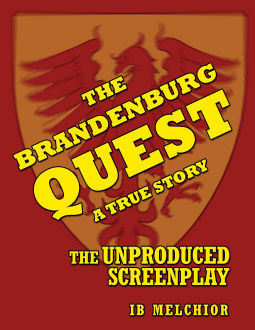
THE BRANDENBURG QUEST, A TRUE STORY: THE UNPRODUCED SCREENPLAY
by Ib Melchior
This title was previously available on NetGalley and is now archived.
Send NetGalley books directly to your Kindle or Kindle app
1
To read on a Kindle or Kindle app, please add kindle@netgalley.com as an approved email address to receive files in your Amazon account. Click here for step-by-step instructions.
2
Also find your Kindle email address within your Amazon account, and enter it here.
Pub Date Sep 24 2015 | Archive Date Feb 29 2016
Description
“When in 1987 I was contacted by a young German citizen who wanted me to write a book about his exploits while looking into Germany’s Nazi past, to learn the truth, I declined. I have my own stories to tell, but I did consent to talk with him. And—after listening to him for a while—I said, “When do we start?”
His investigations, taped interviews, narrow escapes and photographs were startling—but, were they true? Were they factual? Before I became involved I had to know. I contacted two men Frank had mentioned as being helpful to him. One was Eugene K. Bird, Col. US Army (Ret) former US Commandant, Spandau Allied Prison, West Berlin, where all the top Nazi war criminals were interred, and the second was Robert M.W. Kempner, A prominent US prosecutor in the 1945-46 Nuremberg Trials of the top Nazi war criminals. Both these men fully and unhesitatingly corroborated Frank’s accounts. I wrote the book, which I called Quest, with the detailed input of Frank…
…At the time there was a certain interest in such subject matters in the film world, but “Quest” did not really lend itself to make a motion picture. A storyline had to be created without jeopardizing the original material. It took me a while to write such a script based on the tales of Frank but with a definite storyline.”
– from “Introduction to the Film Manuscript
The Brandenburg Quest” by Ib Melchior
A Note From the Publisher
Ib died during the assembling of this book.
Available Editions
| EDITION | Paperback |
| ISBN | 9781593938567 |
| PRICE | $19.95 (USD) |
Links
Featured Reviews
 David W, Media/Journalist
David W, Media/Journalist
As a German teenager, Frank Brandenburg is frustrated and confused about his country’s history. The official story is unconvincing, and no one wants to talk about the past at all. He takes it upon himself to find out the truth. Was there a “holocaust” or not? What happened to all the leaders when Hitler died? This leads him to interview numerous key players in the Third Reich, from retired Generals to Hitler’s secretary. The more he probes, the deeper he sinks. His contacts begin to trust him and see him as new blood, taking the Nazi cause to a new generation. He learns a top secret password that gets people to talk to him, and a general’s ring that immediately opens doors for him. At several points he gets in over his head. Quick thinking and occasional luck save him, again and again. There are several narrow escapes. Every visit provides more clues. People tell him too much, and he leverages it with the next interview.
As he digs deeper, he comes to the conclusion that Martin Bormann did not die with the fall of Berlin. He escaped along well prepared routes, aided by the Vatican. He ended up in South America, as planned. Hitler’s documents, managed by and for Bormann, made it out to Madrid, where they were never found. The film, which was never made, was to end with these (then) startling revelations, and Brandenburg throwing away the cursed ring.
It’s all very cliché, very Hollywood Nazi. This is a screen adaptation of the autobiography of Frank Brandenburg, whose insatiable appetite for truth was apparently more important than life itself. The screenplay is an easy read. The story is totally straightforward and linear. It’s pretty much static scene after static scene, mostly interviews with old men and women. Brandenburg appears in all but one scene near the end. But for all its pedestrian construction, the overarching tension it engenders comes from the fact that it is all verified true. Ib Melchior went to the trouble of vetting everyone and everything. The intro comes from Simon Wiesenthal, who all but begs for someone to produce this picture.
David Wineberg
Readers who liked this book also liked:
Dominic Pettman
Health, Mind & Body, Nonfiction (Adult), Politics & Current Affairs





